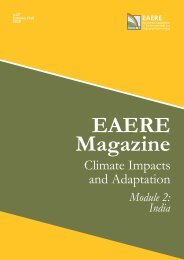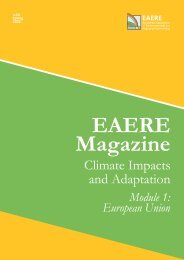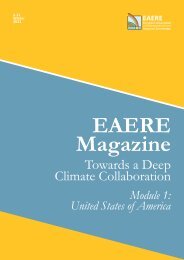EAERE Magazine - n.8 Winter 2020
You also want an ePaper? Increase the reach of your titles
YUMPU automatically turns print PDFs into web optimized ePapers that Google loves.
Exploring willingness to<br />
delay charging by electric<br />
vehicle owners<br />
Ricardo A. Daziano 1 , Briana Amoroso 2 , and Charleen Heidt 3<br />
1<br />
Cornell University, USA, 2 Taitem Engineering, USA, 3 NYSEG, USA<br />
Ricardo A. Daziano, choice modeler, holds a PhD in Economics from<br />
Université Laval and is an associate professor of Civil and Environmental<br />
Engineering and of Systems Engineering at Cornell University. He is a<br />
fellow of the Cornell Atkinson Center for Sustainability. His work focuses<br />
on estimation of microeconometric choice models, applied to better<br />
understand the interplay of consumer behavior with engineering,<br />
investment, and policy choices for energy-efficient technologies. In 2013,<br />
he received an NSF CAREER award.<br />
Briana Amoroso holds an MS in Sustainable Engineering from Rochester<br />
Institute of Technology. She is the Project Manager of New York State<br />
Gas and Electric Corp’s OptimizEV pilot program. Previously, Briana was<br />
a project lead and team member of a variety of New York Reforming<br />
the Energy Vision pilot projects, including the development and launch<br />
of Green Button Connect, an award-winning low- and moderate-income<br />
program, and an online product and services marketplace.<br />
Charleen Heidt holds an MBA with an emphasis on Marketing Research<br />
and Services Marketing from the Smeal College of Business and has over<br />
35 years of practical experience in marketing research and strategic<br />
planning. She is presently the Community Outreach Coordinator for NYSEG/<br />
AVANGRID’s Energy Smart Community (ESC). In this position, she oversees<br />
the marketing and marketing research surrounding the ESC and helped<br />
launch the first offering within the pilot project YES Home Solutions, which<br />
later transitioned into NYSEG’s Smart Solutions, as well as OptimizEV.<br />
Electrification of vehicles is becoming<br />
one of the main avenues for decarbonization<br />
of the transportation market. Even<br />
though there are clear environmental benefits<br />
of renewable-based electromobility,<br />
large-scale charging from high penetration<br />
of electric vehicles (EVs) will require<br />
optimal scheduling of when electricity is<br />
delivered to vehicles (Bitar and Yunjian,<br />
2017; Clement-Nyns et al., 2010). Cornell<br />
University researchers are working with<br />
NYSEG, the electricity and gas provider of<br />
upstate New York, in the implementation<br />
of pilots to optimize integration of electric<br />
vehicles with the energy grid to reduce<br />
load variance and extreme demand peaks.<br />
Coordinating EVs to charge at times when<br />
fewer people require electricity can effectively<br />
prevent stress on the power grid by<br />
reducing peak loads. An illustration of the<br />
flattened load profile that is expected from<br />
coordinated charging is shown in Figure 1.<br />
Smart EV charging can improve reliability of<br />
the power system as well as reduce system<br />
costs and emissions. From the demand side<br />
Figure 1. From uncoordinated peak load (left) to a coordinated, valley-filling load profile.<br />
Source: www.avanewsblog.com/blog/optimizev<br />
15<br />
15













